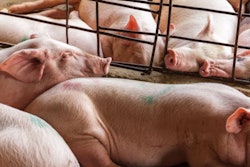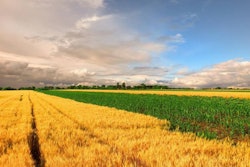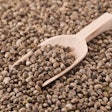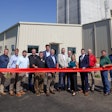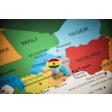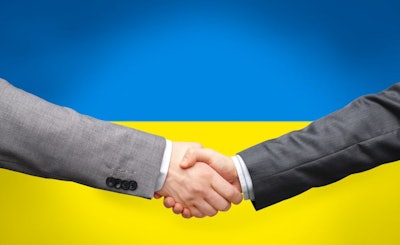
John Rich, executive chairman of MHP, discusses how the company is distributing food aid and maintaining its business in Ukraine amid the Russian invasion
PODCAST: MHP’s Ukraine operations continue with help from industry (46:05)
Ann Reus: Hello and welcome to the Feed Strategy podcast. I’m your host, Feed Strategy senior reporter Ann Reus.
John Rich is the executive chairman of MHP, the largest poultry and feed company in Ukraine. I spoke with him on the eve of the one-month mark of Russia’s invasion of Ukraine about a range of topics, including how his company has continued operating inside Ukraine and the challenges it faces, the situation on the ground in the country and how people outside Ukraine can help with the humanitarian crisis there.
MHP is based in Kyiv, but Rich spoke to me from the Balkans headquarters of its subsidiary in Slovenia, where MHP’s financial team has been based since the start of the war. Although men between the ages of 18 and 60 cannot leave the country, the whole team was able to move because it is made up entirely of women.
I started our conversation by asking him what he’s hearing from MHP employees who are on the ground in Ukraine.
John Rich: I think the key message is that all our senior management, including Yuriy Kosiuk, chief executive officer, and a major shareholder, they are actively working around the clock, day in day out coping with a war situation. I mean, these guys never sleep. And our employees have an amazing, to be able to support us in producing poultry.
At the beginning of the war we were producing, right at the beginning, we were at maximum capacity, of course. And we were producing around about 2,200 tons a day at that particular time. What happened over the first two weeks was that exports stop, of course, because the blockade by Russian naval forces of the Black Sea ports. So, all exports of our grains and all exports of our poultry ceased. Exports across the border into the EU slowed down, then stopped completely, as you know. So, in the first two weeks, we had to transition the business from, first of all, there was a psychological thing: when you enter war, everybody, including Europe, the whole planet was, except for very good intelligence by our military services – I’m speaking about the Western military organizations – they could see that there was a war coming. But, generally, people are in, in these sorts of things, these situations, are in denial. So we had to, when the war started, we had to transition the company pretty quickly from denial into acceptance, because unless you’re in acceptance, you can’t operate properly. So that was the first challenge on the psychology side. But luckily, due to COVID, the communications systems between individuals working at home, different locations, etc., were all very well established, which allowed the company to mobilize its people to different areas and where they were basically needed to conduct operations.
And I think that, in MHP’s case, there are two big sides to this story. Firstly, of course, we went from being an exporter responsible for probably 5% to 6% of total global exports of poultry, and switched into, pretty much over the period of few weeks into 100% of the production of Ukraine. And the reason for that is that all the eastern parts of Ukraine are affected by war, far more than we are, which is on the west, we’re relatively unaffected. So, this meant that a lot of poultry, people that were operating, they ran into logistical problems, they couldn’t get feed, there was rail infrastructure that was destroyed. The far East was a disaster, there was direct evasion. So, what’s happened, and the big pork producers in the East, from the Poltava region back towards the east ceased operating. And so consequently, the food supply chain failed. So MHP had to take up the gap. So, 100% of our production capacity was focused towards Ukraine, for food security reasons. We couldn’t export so that was relatively easy to switch. Mind you, of course, that in these sorts of situations you tend to produce more bulk poultry, it’s not packaged because you don’t have access to packaging materials and all the things that you’ve got to do in a poultry business. When you go into what I call a war-type situation.
What happened there was that the poultry was, as soon as there was carpet bombing and the, what I call 19th century technology applied to the 21st century, on cities in Ukraine, we had an enormous refugee crisis and enormous number of women and children had to be moved, particularly hospitals and schools were bombed as you know. You know, the story – what’s been depicted in the press is accurate. And so, and then technically today, we have probably up to 30% of our total population of Ukraine is displaced. And roundabout three and a half million women and children have left. And so the whole company is changed into a humanitarian-type company. Right now, we give away, pro bono, up to 400 tons of our production per day, just to stop people starving. So there’s production, but it’s the distribution is the key. You can produce something, but if you can’t distribute it, it’s useless.
Luckily, MHP, about 50% of the domestic market of Ukraine before the war had the distribution capabilities because we own the largest cold-chain distribution operations in Ukraine, were able to mobilize that towards distributing food to all destinations, including the outskirts of these bombed-out cities such as Sumi, Kharkiv. Mariupol, I might add, is a complete disaster. You see that every day from the popular press. But what we’ve been able to do is to distribute a lot of our ready-to-eat-type products, value-added further processed-type products, we’ve switched production into these dramatically, so that people, when they get those products in the outskirts of these bombed-out cities, then they can eat them immediately. Do you understand, they’re starving. So, this whole situation, to put it blunt, changing a business model into from where we were to a humanitarian aid-type situation from within a country is, we’ll write the textbooks about it later, for sure.
But it’s been an enormous challenge, but if it wasn’t for the patriotism of Ukrainian people, volunteers, the assistance of the Red Cross, this could not have been done. I mean, it’s about the will of the people. This is something that really has come through. It’s not the fighting side of every male between 18 through to 60 is effectively in the defense forces. It’s not about that. It’s about everybody else that’s not in that line of fire are doing their bit to fight a war. And when it comes to food security, we originally had a deficit of drivers, because driving these trucks into these areas is a logistical nightmare. Because we have 20,000 or 30,000 people on the ground with mobile phones. And through this sort of network, we’ve been able to pick which roads are working, which bridges are bombed, which aren’t, whether there’s military forces in one area versus another area. And all this has been critical in allowing us to distribute poultry products through to these red zones, we call them, but then getting them through the red zone, we can’t do in most cases. The Red Cross has been able to get some product through at certain areas in eastern Ukraine. Obviously the high-conflict areas, such as Mariupol, where the Russian forces are starving the population out. Well, not much we can do except feed the people that are escaping outside of that area, and feeding them as they get out of that area. But really, it’s been huge, a huge challenge.
Reus: Aside from its poultry operations, MHP also has crop and grain operations. Rich said the company produces 2.5 million to 3 million tons of grain per year. Ukraine is a significant producer and exporter of grains, especially wheat, corn and barley, as well as sunflower oil. According to the Ministry of Agrarian Policy and Food of Ukraine, the country exported 23.1 million tons of corn and 16.6 million tons of wheat in the 2021-22 marketing year. Together, Ukraine and Russia export approximately 29% of the world’s wheat exports and account for 90% of the world’s corn exports. So, will Ukraine be able to continue producing crops amid this conflict?
Rich: If you remember, Ukraine produced around about 80 million tons of grain last year, but normalized it’s about 60 to 65 million tons. So last year was exceptional, but it’s all in storage. As you know, we didn’t get the opportunity to export it all and so, consequently, of course, a lot of the storage is in port areas, and they’ve slowly but surely been destroyed.
So, you know, you’ve got this issue, first of all storage of the grains that we did produce last year have been locked up in the country, and some of them are some slowly but surely being destroyed. The second issue, I suppose, you know, for the company is, is that not only our storage is full, but then we’ve got to produce a crop, and we have to produce a crop, and there’s two reasons for that. First of all, is what I call general food security of Ukraine. We have to do that. And we have a moral obligation to do that, not only for Ukraine, but also a moral obligation to do this for food security globally, particularly big companies like us. Why? Because, look, MHP is one of the biggest agribusinesses in Europe, it produced, just in Ukraine alone, over 800,000 tons of poultry. We produce between two and a half to 3 million tons of grain a year, we produce between 200,000 to 250,000 through to 400,000 tons of sunflower oil. So, you know, and as you know, this area of Ukraine and southern Russia, of course, the so-called breadbasket produces 25% to 27% of global wheat supplies, it produces 50% of all sunflower and sunflower byproducts such as oil globally, and 20% of rapeseed products, 70% of barley for Europe. These things are critical.
And, see you’ve got a third dimension here, on one side, for wheat, in particular, for consumption in the Middle East, North Africa, and also all the way to Indonesia, you’ve got that aspect. And then you’ve got the aspect which affects our industry as poultry people, and that is feed that was going from Ukraine and Black Sea, into Europe. And that was a natural no-brainer, because of freight costs. So this is all stopped, as you know, and this is, it’s a clear and present danger, unfortunately, for all poultry producers in Europe and the United Kingdom.
So I suppose, here’s this the quick and dirty for the poultry industry. For all my colleagues, that I might add have been incredibly, incredibly supportive in Europe and the United Kingdom. You know, it’s funny how a war draws people together, and certainly has in the poultry industry, in this particular case. But the message is fairly clear. A lot of the estimates that are being produced by a lot of, you know, very senior analysts, I might add, seem to predict that Ukraine is still going to be able to produce a relatively large amount of grain this season. The fact is this, from somebody that knows what’s happening on the ground: the eastern areas and the southern areas of Ukraine are generally higher wheat producers. And so that country was used is used for winter wheat, and often, because of climatic issues, spring wheat. Those areas are out of commission, frankly. It’s the Russian occupied areas. In some cases, the Russian forces have destroyed all the equipment, all the infrastructure, it’s been a scorched-earth policy. When we move through to the central areas and the western areas, we don’t have occupied forces there at present. So that means that the land integrity is OK. In MHP’s case, as you know, we farm, entire land holdings about 380,000, 360,000 is generally in operation. This year, we’ll be able to plant probably around about 340,000 approximately. In other words, we’ve lost you know, maybe 10,000 or 15,000 hectares in that order, which are under Russian occupation. In that case, we’re in pretty much good shape.
The company always has, because it’s been a very successful company and has always had enormous liquidity, it had already purchased all its fertilizer requirements, all its crop protection products, well 90% of it, we had all our diesel, we’ve got everything in place to sow and plant. So with the winter crops, we are tilling now, and so that’s business as usual for all our unoccupied lands, which is, as I said, 90%. And when we’re looking at spring crops, we will be sowing within the next two weeks. So we are starting to plant in the western and central areas of Ukraine. So we are an outlier, frankly. Some companies, within the Poltava region towards the east, probably have 80% of their lands occupied. So, totally different story. So the bigger people generally are all committed to planting at present, and they have the resources to be able to do it. But the 80/20 rule is that, that it’s the small farmers, which is from 500 hectares to 20,000 hectares for the bulk of the production of Ukraine, and those farmers in relatively unaffected areas by the war, they have serious issues.
Firstly, they have an issue of the simple unavailability of fertilizers, whether nitrogen or phosphates, they just simply not available. They have the unavailability of fuel, crop protection products, all these sorts of things they don’t have. So with the spring crop that’s coming through, they can probably till it, but then fertilizing it and doing everything else at present is out of the reach of the smaller farmers. And not even that, if they could buy fertilizer, they no longer have working capital lines from banks to be able to fund it. Even though the Ukrainian government is trying to solve this issue by providing some funds to these farmers, the availability is a huge problem. And therein lies what I say the key assumption that everybody’s making is they think those farmers are going to be able to grow and export. I agree with the Ukrainian agriculture minister this morning, I think this is going to be very, very challenging. So the markets, the pricing, they think that maybe Ukrainian grain production could be down 27%-30%. My estimation is that, at present, if this war stays the same, and there is no major movement by Russian forces, then even under these situations, it could be very challenging to, I think it’ll be significantly lower than what most analysts are saying. So what does that mean? It’s the law of supply and demand that drives pricing on one side and the hedge funds and derivatives on the other. So where the hedge funds have positioned themselves and where that is at present I don’t know, because I haven’t been studying it. But as far as supplies are concerned, I think that it will be challenging out of Ukraine and with sanctions on Russia, it depends upon the leakage around the sanctions. Some countries don’t have sanctions, and they will be able to acquire Russian wheat through the system, but then it depends upon additional sanctions that will be brought in by the Europeans and the United States government, which may make it impossible for even people that don’t have sanctions to be able to receive wheat.
So it’s highly volatile. It’s a clear and present danger. And I just think that presently, Ann, the grain supply situation is going to be very, very challenging for European and for United Kingdom producers. I mean, forget Bali; I just don’t see that happening. As you well know, global wheat supply stocks are low. Last year, there was a shortfall of 8.8 million tons and prices went up 22% in 2021. The shortage I believe could be 10 times that, because of what’s happening in our area, and if that’s the case, I don’t know where prices are going to go. But it’s going to be very dependent upon the El Nino effects in the southern oceans – as you know, Australia’s just come out of massive floods. A lot of its grain produced at the end of last year, in some areas, it’s only just been harvested and very heavily affected by weather damage, which means is not suitable for normal flour production. So you’ve got that issue in Australia. Canada, so far, so good. But with but then the flip side across into soy-corn cycle in the Americas and El Nino in the Americas is developing as it’s clearly been shown in some of the Rabobank reports, and if it continues like that, and it could because of the volcanic explosions in Tonga, and the cooling of the Pacific waters, you know, we could have a challenging situation in the Americas. So for poultry producers, it’s nervous times as far as raw materials are concerned.
We just hope that it stays at the status quo and we are allowed to grow our crops, and then exporting them will be incredibly challenging. All the ports are closed, just remember all the grain and oil, everything went out through the ports. There’s only 600,000 tons of rail capacity between Ukraine and Europe. So you know, some grain exports go out this way towards Europe, particularly oil production, once we get the gauges sorted out. We’re running 19th century gauges between Ukraine and Europe, unbelievable. Three different gauges. It’s just unbelievable for the 21st century. So, you know, logistics are very difficult to get into Europe. It’s not an easy situation to resolve and manage. And that’s if we assume the status quo, alright. And I don’t think the status quo will be maintained forever. I think that there will be one major attempt by Russian forces to try and take Ukraine, otherwise, it will be seen globally as a complete failure and leave political issues running all the way through to the Kremlin. So I don’t know how all this is going to end. But at present, we’re planning to plant as normal, we plan to produce poultry as normal to set aside the food security needs of the nation. If we had surplus that was possible to export, say, to the Middle East, we would try to do so. But there’s so many ifs here, as far as that’s concerned, at present it’s impossible anyway, because of export bans.
And the company has other challenges, which are not dissimilar to what poultry companies in Europe have. It’s about working capital. Now, in our country, to plant, normally, we would have short-term facilities available for us for working capital for cropping. But of course, because of the war, and martial law in Ukraine and central bank regulations, we can’t raise working capital from normal banking lines because of what we call conditions present under war. So, that means we have to fund everything. Now, MHP had a very good liquidity position, because it came off the back of an extremely good year last year. But we have to be careful about how we spend that money because if you ran out of money there is you don’t have access to facilities, so extremely cautious about the application of funds. In that particular case, we’ve got to fund the complete cropping program for the whole year, internally, OK, which we can do. But it means that, you know, the normal businesses as normal is not normal. And Ukrainian Central Bank has regulations where we have to repatriate money from outside of Ukraine into Ukraine. And then once it’s in Ukraine, you can’t get permission to send it out of Ukraine to pay interest to banks, or bondholders. It’s a force majeure situation.
Reus: How much of your workforce have you lost to either those who have gone off to fight or who have had to leave?
Rich: Yeah, around about approximately, now, I think it’s about between 10% and 15% of our workforce has left to join the armed forces. It obviously changes day by day, but we’ve been able to – MHP’s in a unique situation just because of demographics of Ukraine, and post-perestroika from basically originating from World War II, there are always more women than men. So a lot of senior positions were held by women. In fact, our workforce was orientated just slightly above 50% were women. What’s happened is that, before the men have gone to war, a lot of women have been retrained to take the men’s position then. So, at the beginning, we were anticipating problems. But what’s happened is that, with a lot of other businesses that are closed, other people have come join our workforce. And so consequently, our labor situation is good. We haven’t had a problem. We’re in relatively safe areas too, which makes it obviously much easier.
The biggest issue we had originally was drivers. These drivers have got to go into very dangerous situations, right? Life threatening day in and day out. We had a drop in the number of drivers, a lot of those drivers went off to join the military. But what’s happened is that there’s been a redistribution of labor in Ukraine. So now we have no shortage of drivers, because people have decided that their duty in life is to drive these trucks, with humanitarian aid and poultry across the country to feed their people. So now that’s happening, which means that the situation three weeks ago that was looking serious, is now balanced.
So as long as we maintain the status quo, labor force is intact, all our production facilities are intact. The distribution system is intact. The only thing that did suffer significant damage was rented facilities. In this particular case, the biggest cold store unit in Ukraine, which is north of Kyiv, was 100,000-ton capacity. We rented space there. Well, it was destroyed, it was in two parts, and Russian missiles, ground missiles were fired into it and destroyed both the facilities completely in attempt to destroy the food production, distribution channel and starve the population. And I might add, it was pretty effective because most supermarkets use these facilities for distribution or to store. So this meant that MHP had to take a major role now in assisting supermarkets that still are operating throughout the country, to distribute food. As simple as that. So apart from rented facilities, and loss of product associated with it, which were published in our RNS on the London Stock Exchange, I think that we have some storage facilities, of course, in the southern areas, Odessa, etc., regions, which are inaccessible due to logistics. That’s logistics meaning you can’t get in and out, can be either due to a conflict zone, which it generally is, which either held by Ukrainians or a conflict zone is held Russians, but, but apart from that, the operations are running relatively normal, as I speak.
Reus: In one of your recent updates on the London Stock Exchange, you said you had to shift your feed production to mostly corn diet due to the port closures and other logistics. Can you tell me some more about that, and what’s needed to make a switch like that?
Rich: I can, actually, and what actually happened is that at the beginning of this disaster, we had to close all our oil plants, so all our protein plants, which is, which is sunflower, we use sunflower, as you know, as a protein source. We’re one of the few in the world that do so. And we don’t use soy for broiler production – we do have a soy plant, but we use soy in the parent stock operations. So everything had to be turned off because we couldn’t export oil. OK, so no product. That was the first week.
Then the next issue was the logistical challenges of trying to get, source and get critical vitamins, minerals, enzymes, all these sorts of things into Ukraine. That was a huge logistical challenge, to be able to get our supply in situ for this. Your readers have been of enormous help. All the big international companies have assisted in ensuring that we have continuity of supply, and a large number of them have been providing it pro bono. In other words, that is their contribution, the poultry industry’s contribution to helping us feed our people. That is laudable, no question, and the message to everybody that’s helped in that regard – and there’s not a single company that I think has not given us enormous support – it is enormous. Thank you for being able to assist us as a company. A lot of these companies, you know, it wasn’t so long ago, a couple of years ago, we’re all at war against each other. But at least this particular war has drawn Europe together and certainly has drawn the poultry industry together. I think that my message to all those international companies and supporters is an enormous thank you, because they have been instrumental in assisting MHP maintain the food supply chain within Ukraine. Because without that, logistically, getting food into the country is extremely difficult, and you would have mass starvation. And that is a reality.
So, as far as that’s concerned, what has happened since this assistance, we managed to be able to get a rail link operating between our soy oil operations and Europe. This meant that we could reopen our soy plant, which we’ve done, and export the oil across the border. That’s allowed us to get soybean meal into the rations, right, which then meant that our rations are much more balanced, obviously, now balanced properly. So, we went through a period of a couple of weeks with without, we were just feeding corn and not much else. And of course, that’s a disaster, as you know, nutritionally. But that is now no longer a problem. We can produce what we need within the country now, as long as these facilities remain operating. In other words, they’re not directly targeted, or the rail links – as you know, there’s a number of rail links between Ukraine and Western Europe, as long as they are not targeted by Russian military forces, then we will be able to continue to feed the birds properly.
Reus: Are the supply chain disruptions affecting the availability of feed additives and other ingredients?
Rich: It is, but we’ve managed. In other words, now we seem to have got on top of it. But that’s all because of international help, frankly. I mean, international company help. They’ve been doing everything they can to channel everything via Poland, in particular, and Romania, and this has allowed us to be able to get our vitamins and our minerals and all those sorts of things into the country to feed the birds. So that has been instrumental in us being able to operate within our country.
Reus: What do companies like yours need right now to continue operating and feeding the people of Ukraine?
Rich: We’ve got the grain in situ, right, because MHP tends to store its full-year requirements. So, grain’s not the issue and we have protein meal, so I think if it’s possible to open our sunflower plants in the future, because of better logistics between Europe and Ukraine, that will be of great assistance. So it’s something that’s, it’s all about logistics, right? It just was not built for mass transit of goods from Ukraine into Europe, via rail instead of port. So not much can help there except enormous amount of effort by all European institutions, and also the Ukrainian government to be able to try and make that happen.
MHP’s biggest issue, I think, is that when you’re giving away 15% or so of your total production pro bono, of course, that comes at a large cost. So originally, a few weeks ago, we were trying to work out ways of how you maintain the integrity of the food supply chain and distribution chain within the country, the biggest, alright, for food security and humanitarian reasons, how do you maintain that when you have no help? Because people that donate, right, they won’t donate directly to a Ukrainian company. It just doesn’t work that way. They might donate to the Red Cross. But I think that what has helped in the last few days, we’ve come to an in-principle, collaborative agreement with the United Nations World Food Programme. Those people are highly professional, highly recognized. They understand conflict zones, that’s what they were formed for. They have resources in Poland. They have some sort of infrastructure in Ukraine. So what we’ve decided to do is to work with the World Food Programme, we’re going to provide our logistics to assist essential things coming into Ukraine, and distributed, and they will also assist in MHP maintain the integrity of the whole food chain in Ukraine. So, it’s support from within, because supporting from outside is a very difficult issue. You can donate a can of baked beans, take it to the Polish border, but to get it to Kharkiv is not easy, not without MHP’s distribution system. Because it’s the largest, and one of the few that’s left operating. This collaboration, I believe, will be instrumental in helping MHP being able to do this. And of course, you know, this means that for the services that we provide, at least we get paid for it. Do you understand? Because, I mean, you can’t continue this forever. If it’s a war of attrition for years, of course, you’re not going to have the financial resources to be able to provide a country pro bono with its humanitarian aid.
Reus: What do you want people outside of Ukraine to know about the situation there?
Rich: There is one really important message, but it’s to do with corporate governance, alright. This is a situation without precedent, since World War II, and it is the biggest war in Europe since World War II. People will dance around the words, but a simple war of Europe, and it has the potential to spread outside of Ukraine as well, but not today, you know, because I believe that the forces that are in place in Ukraine are battling to try and take Ukraine.
So I don’t think that, you know, unless there were, there were other, what I call unthinkable things happening as far as weaponry was concerned, I think that, you know, the risks to other neighboring countries today, are probably relatively low due to the inability of the Russian army to move there. But the problem I have corporate governance-wise, is that we’re a listed London Stock Exchange company. And there’s a number of other listed companies, big people that are in our space, in Ukraine. Now, all of us have the same problem, but MHP has a unique problem. The bigger companies that are listed, which are predominately sunflower crushers, in particular, just export oil, have just stopped and that’s it. MHP just can’t do that, because it’s got to feed the people. So it has a massive role in food security, to prevent starvation in the country. And people are starving, no question, in this country. And they are under enormous cold stress, because it’s still cold there, and everybody’s forgotten about the fifth Horsemen of the Apocalypse, and that was pestilence, right, disease. COVID is still raging there, and all their women and children have got it. So you’ve got this dimension.
In our case, right, we have a number of corporate responsibilities, right, clearly set out – our responsibilities, right, we’ve always, under the U.K. corporate governance laws, to all stakeholders. That’s a simple statement, we’re going to treat all stakeholders equally. However, when you are dealing with corporate governance issues in a time of war, this textbook has not been written, alright. So, what does the word responsibility mean, in war, when it comes to partners and to stakeholders? And my messaging this week, to everybody, globally, across the planet, is that corporate governance has to it’s got to be a little bit interpreted and reinvented a different way. Let me explain why. When we talk about stakeholders, most financial people think, OK, that’s investors, bondholders and banks, right. This is what they think.
But now, thanks to recent changes in over the last decade, people now see employees as stakeholders, they see suppliers as stakeholders, you know, all the people that you touch, right, you have a responsibility as a stakeholder, which is which has been incorporated into the corporate governance law, which is good. It’s good, alright? And definitely in the West, and particularly in Europe, and the United Kingdom, there’s been very, very strong messaging by the authorities that this has to be, which I think is a is a great thing. In a case of war, right, what does it mean for MHP as a listed company today, when it comes to stakeholders? And here, you know that we’ve got 30,000 people that work for MHP within Ukraine, under duress, OK.
Then, what people forget, is that a lot of their families lived in those bombed-out cities. They might have worked in the Western area, but their families were in the East. So all these families that are refugees have then come to live with them. So, all of a sudden, you might have been an employee with two to three people in the family and then now they’ve got 10 they’re supporting. But these are the stakeholders, these families. So this is a war situation with refugees that nobody thought about. And then you’ve got suppliers of MHP, and what does that mean? Well, it’s not only materials, you know, plastics and this and that, it’s also farmers because farmers also supply MHP a large amount of sunflower as an example, and soy, because we’re one of the biggest crushers in Ukraine. So these farmers, they are our stakeholders as well. And then on top of that, MHP – as you know, land is leased in Ukraine, it’s not purchased, and it came from the old cooperative, perestroika system. So we have 200,000 land holders that we pay lease fees to every quarter, which they rely on that money to survive in the villages. So then when you add up all our stakeholders, there’s over a quarter of a million people. So, in a war situation, right, you’ve got to support them, right? You have to support our staff. So there’s a humanitarian issue to this, a massive one.
So then you get conflicts, I believe, the biggest issue is that we as a group, right, have to be together as partners. And this togetherness is critical. Because we’re all equal. Some needs are greater than others, you know, starvation, children starving, these sorts of things, you know, are they more equal? Do you understand? This is the moral dilemma, I believe, of what, when we wrote corporate governance law, we never anticipated World War III in Europe. So for us, to me, we’ve got to treat everybody equally. No question, alright. And this is sometimes hard to get across to finance institutions, OK, that might be sitting in their lounge chairs in New York, you know, this is a concept that they can’t imagine because they’re not there to see it and experience it.
So my thesis is this: that everybody must be in this team equally together. They must, alright. It is our moral obligation. And, you know, I think that, if we’ve got this, you’ve got to remember that unity, for all of us is the strength, the best way for the country, and our company to survive is through unity, alright? Division is a weakness, is a disaster. And then the country and the company fails if there’s disunity between all stakeholders. And at stake here is just a bigger, bigger picture. At stake today, what we’re fighting for Ukraine, and what Europe is now fighting for, is our ability to maintain a democracy in Europe for the future. So this is a big deal. It’s about corporate governance, alright. At the end of the day, the message has got to be everybody’s got to be treated equally, no question, that all people have to understand that our social responsibility is here, to the people of Ukraine, alright, and also co-laterally, to people that we export to outside of Ukraine, that such as the MENA regions, in relation to food security, is critical. Alright, so everybody’s got to work together to solve this particular problem and support each other. That way, you guarantee the continuity of the sovereign state of Ukraine and preserve the companies within it.
Reus: If people want to help Ukraine with charitable donations, what groups should they give to?
Rich: Red Cross, without question, is doing a very good job, because it’s direct to people in need, you know, particularly on the medical front. You’ve had hospitals and schools bombed out, I mean, it’s just dreadful, these atrocities. And the Red Cross is trying really hard to manage that and it’s difficult. And they’re doing a very good job of trying to get into zones that we can’t get into, right, and we assist the Red Cross that way. We provide fuel where we can, we help fuel buses, getting refugees back out again, all these sorts of things are often done with the Red Cross.
With the World Food Programme, I think it’s, at present, a much better and more centralized way to do this, because what the World Food Programme is trying to do – sure, it’s providing some food to the borders but, logistically, getting into the country is difficult, and then distributing it is very difficult. So I think that the best way to help MHP in many ways is to support the World Food Programme system because they have a mandate to be able to preserve the integrity of the Ukrainian existing food system for the future, OK, in other words to preserve the ability of Ukraine to feed itself. That is critical, and I believe in that mandate. So, my short answer is that by working with the World Food Programme, and they’re extremely professional people, and been in business for a long, long time as a United Nations arm, probably is one of the best ways that MHP and the country can be supported at this time where we’re using the concept of feeding from within and distributing from within.
Reus: And if you would like to contribute to the World Food Programme, you can do so at wfp.org. You can donate to the Red Cross at redcross.org.
I would like to extend a big thank you to John Rich, MHP’s executive chairman, for speaking with me about the situation in Ukraine, and also thank you to the audience for listening. This is Ann Reus for Feed Strategy.


